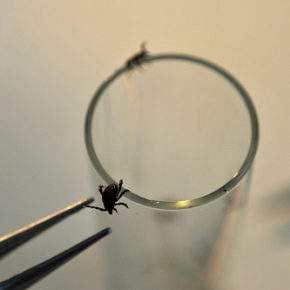Anna Lacasta1, James Nyagwange1, Nicholas Svitek1, Samuel Oyola1, Sonal Henson1, Lucilla Steinaa1, Vish Nene1, Ine de Goeyse2, Neena Mitter3, Michael Yu3, Fred Fellouse4, Neil King5 1International Livestock Research Institute (ILRI), 2Institute for Tropical Medicine, 3Univeristy of Queensland, 4Univeristy of Toronto, 5University of Washington. East Coast fever is present in 11 countries where roughly 28 million … Continue reading
Category Archives: ECF
New publication: Immune parameters to p67C antigen adjuvanted with ISA206VG correlate with protection against East Coast fever
Three doses of p67C antigen generated stronger immune responses than two doses. Antibody titres and CD4+ T-cell proliferation correlated with protection against East Coast fever. The number of doses could not be reduced from three to two without compromising the protection. Continue reading
Characterization of the Theileria parva sporozoite proteome
To support research on the biology of T. parva and the identification of additional candidate vaccine antigens, this article reports on the sporozoite proteome as defined by LC–MS/MS analysis. Continue reading
Approaches to vaccination against Theileria parva and Theileria annulata
There is a great deal of similarity in the immunopathology, genomics and biology of T. parva and T. annulata. Similar protective immune responses are directed against the sporozoite and schizont stages of the parasites, and it is remarkable that many candidate sporozoite and schizont antigens are also so similar to each other. Hence, advances in development of subunit vaccines against one parasite species are likely to be readily applicable to the other. Continue reading
How to validate an antigen candidate for T. parva
The ECF consortium is aiming at producing a vaccine that would trigger both an antibody response and a T cell dependent response. Thanks to the whole genome sequence of Theileria parva and its annotation, we have short listed hundreds of antigen candidates, but the number of antigen candidate that can be tested in cattle is limited. How do we narrow down the list of candidates to a handful that can be studied rigorously in live experiments? Continue reading
Can we remix the East Coast fever Muguga cocktail?
The recent meeting of the East Coast fever consortium, which brings together experts in immunology, parasitology and genomics from three continents (ILRI, Edinburgh, Antwerp, IGS, as well as the organization that produces the infection and treatment method (ITM) vaccine, provided a venue to discuss a way forward. Continue reading
A cow by any other name would probably still be smelly! On cattle MHC genotypes
As part of a BMGF-funded consortium a novel Next-generation-sequencing (NGS) approach to high-throughput MHC typing of cattle has been developed that allows rapid, cheap and high resolution characterisation of bovine MHC genotypes Continue reading
Can cancer biology help us understand East Coast fever?
A recent review, as well as current studies in the primary literature, present examples of how cancer research can be used in the study of Theileria biology, suggesting that this might be a turning point that could revolutionize how T. parva infection is studied. Continue reading
Discovery of novel candidates for the development of targeted vaccines against East Coast fever
We are here aiming to directly identify the parts or ‘antigens’ of the Theileria parva parasite that are visible to the cellular immune system during infection using a state-of-the-art mass spectrometry approach in order to inform the development of targeted vaccines against Theileriosis. Continue reading
Parasite (sporozoite) proteomics impact in ECF research
The partial success of subunit vaccine candidates based on sporozoite proteins give rise to the belief that sporozoite surface antigens might constitute neutralizing vaccine candidates. This milestone together with the protective immunity of whole sporozoite infection and treatment vaccination can be further built upon in order to ultimately achieve protection against ECF infection with a multivalent subunit vaccine. Continue reading
